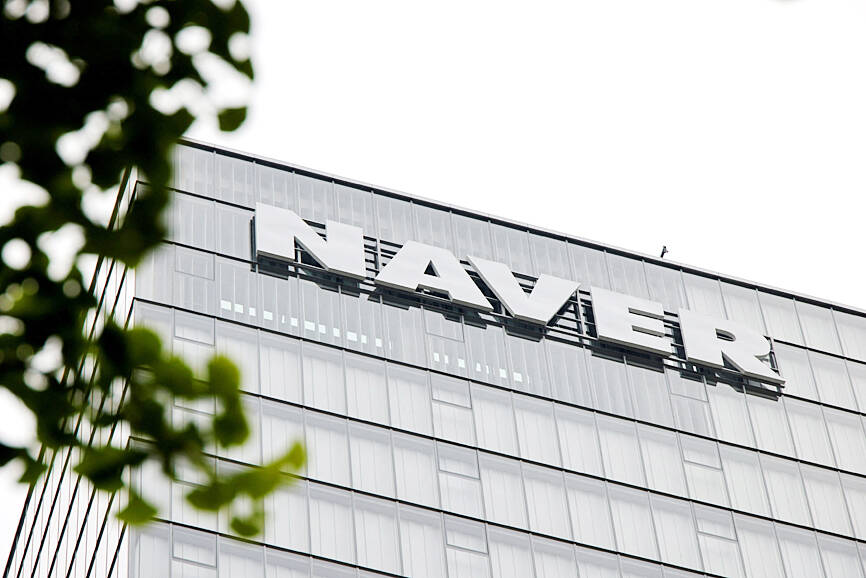Seoul has urged Tokyo not to discriminate against South Korean companies, the South Korean Ministry of Foreign Affairs said yesterday, after reports that technology giant Naver Corp is under pressure to sell its stake in Japan’s top messaging app.
South Korea’s Naver developed Line 13 years ago and now has more than 95 million users. It is also popular in Taiwan and Southeast Asia.
The app is operated in Japan by LY Corp, which is majority-owned by A Holdings, a joint venture between Naver and Japanese investment firm Softbank Group Corp.

Photo credit: REUTERS
Japanese reports last week said that Tokyo had demanded LY Corp review its relationship with Naver, with the Kyodo news agency saying Softbank was in talks to buy Naver’s LY Corp shares.
“We maintain a firm stance that there should be no discriminatory measures against South Korean companies,” the ministry said in a statement.
The South Korean government plans to discuss the matter with Naver “if necessary,” it said.
Line has been under scrutiny in Japan over a data leak involving more than 500,000 records last year, which prompted the Japanese Ministry of Internal Affairs and Communications to issue administrative guidance.
Line’s “strong dependence on Naver in terms of systems and network configuration” was among the causes of the leak, the Nikkei reported the ministry as saying.
“This relationship has also made it difficult for your company to demand appropriate safety measures from Naver and to implement proper management,” it said, referring to LY Corp.
One of South Korea’s biggest technology companies, Naver, and its myriad services — including Google-like maps, financial services similar to Apple Pay, and popular blogs and chat forums — are used daily by many South Koreans.
The unfolding situation is a “mismatch” for South Korean President Yoon Suk-yeol, who has been trying to improve ties with Japan in the face of military threats from North Korea, Sejong University business professor Kim Dae-jong said.
“Under global standards, countries do not demand companies forsake their shares — just like we don’t demand Facebook sell theirs over privacy concerns. Japan should follow such standards,” Kim said.
However, Seoul is not in position to block the deal as it does not involve national security, he said.
Naver declined to comment.

SEEKING CLARITY: Washington should not adopt measures that create uncertainties for ‘existing semiconductor investments,’ TSMC said referring to its US$165 billion in the US Taiwan Semiconductor Manufacturing Co (TSMC, 台積電) told the US that any future tariffs on Taiwanese semiconductors could reduce demand for chips and derail its pledge to increase its investment in Arizona. “New import restrictions could jeopardize current US leadership in the competitive technology industry and create uncertainties for many committed semiconductor capital projects in the US, including TSMC Arizona’s significant investment plan in Phoenix,” the chipmaker wrote in a letter to the US Department of Commerce. TSMC issued the warning in response to a solicitation for comments by the department on a possible tariff on semiconductor imports by US President Donald Trump’s

‘FAILED EXPORT CONTROLS’: Jensen Huang said that Washington should maximize the speed of AI diffusion, because not doing so would give competitors an advantage Nvidia Corp cofounder and chief executive officer Jensen Huang (黃仁勳) yesterday criticized the US government’s restrictions on exports of artificial intelligence (AI) chips to China, saying that the policy was a failure and would only spur China to accelerate AI development. The export controls gave China the spirit, motivation and government support to accelerate AI development, Huang told reporters at the Computex trade show in Taipei. The competition in China is already intense, given its strong software capabilities, extensive technology ecosystems and work efficiency, he said. “All in all, the export controls were a failure. The facts would suggest it,” he said. “The US

The government has launched a three-pronged strategy to attract local and international talent, aiming to position Taiwan as a new global hub following Nvidia Corp’s announcement that it has chosen Taipei as the site of its Taiwan headquarters. Nvidia cofounder and CEO Jensen Huang (黃仁勳) on Monday last week announced during his keynote speech at the Computex trade show in Taipei that the Nvidia Constellation, the company’s planned Taiwan headquarters, would be located in the Beitou-Shilin Technology Park (北投士林科技園區) in Taipei. Huang’s decision to establish a base in Taiwan is “primarily due to Taiwan’s talent pool and its strength in the semiconductor

French President Emmanuel Macron has expressed gratitude to Hon Hai Precision Industry Co (鴻海精密) for its plan to invest approximately 250 million euros (US$278 million) in a joint venture in France focused on the semiconductor and space industries. On his official X account on Tuesday, Macron thanked Hon Hai, also known globally as Foxconn Technology Group (富士康科技集團), for its investment projects announced at Choose France, a flagship economic summit held on Monday to attract foreign investment. In the post, Macron included a GIF displaying the national flag of the Republic of China (Taiwan), as he did for other foreign investors, including China-based